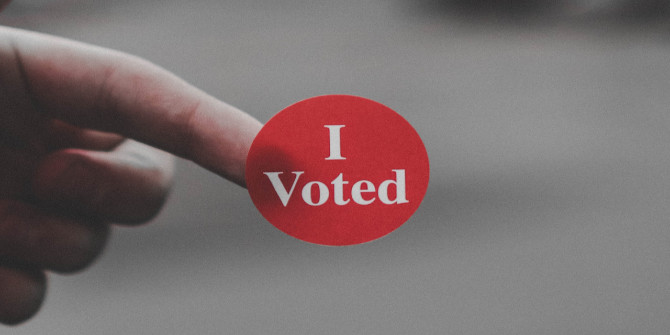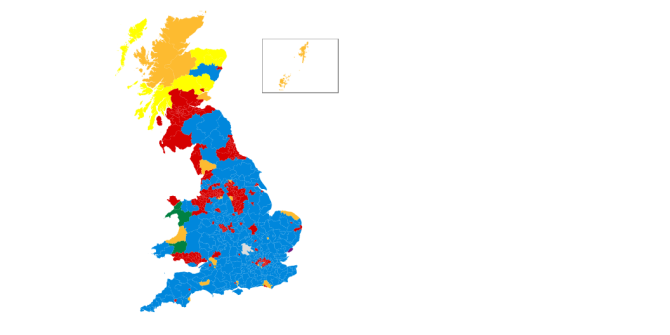
 Zac Greene and Lauren Toner discuss the results of a survey of 1,500 respondents evaluating their level of support for parties to hold conferences online in the future.
Zac Greene and Lauren Toner discuss the results of a survey of 1,500 respondents evaluating their level of support for parties to hold conferences online in the future.
With conference season over, the impression that the major political parties have struggled to reconnect with supporters lingers. For example, disputes at the Labour Party’s conference were compared to the ‘torrential rains and gale force winds that met the delegates’ by one observer. The Conservative Party hardly received more positive reporting, with news coverage in the week building up to the conference having focused on poor polling figures and a number of domestic crises.
Largely undiscussed was the fact that these conferences marked the first in-person events for the parties since the onset of the pandemic. The preceding meetings were virtual, using technology that attempted to provide a conference-like experience, but with some opportunities for participants ‘to share ideas and hear from voices across the party’. Yet, the move to an online setting likely had unrecognised consequences for deliberation and debate, including by potentially handing even greater control of the parties’ messaging to party leaders. Zoom and other online platforms afford organisers greater influence over the content of debates through a much narrower selection of speakers, fewer impromptu replies, and even a mute button. Such events also substantially limit the participation by party members that more traditional in-person events facilitate. Concomitantly, the online setting allowed far more people to attend events with fewer costs, thus increasing access to otherwise more exclusive gatherings. This change then, offered a set of trade-offs with regards to parties’ internal democratic processes.
In a working paper, we consider these reforms further by linking the shifts to and from online conferences to theories of legislative agenda control. In September 2021, we fielded a nationally representative survey of nearly 1,500 respondents in the UK to evaluate their level of support for parties to hold conferences online in the future. We were not only interested in respondents’ general attitudes towards the meetings, but also sought to examine how the potentially positive and negative effects of this reform led to variation in support.
We identified four aspects of the events that online meetings likely impacted: the diversity of speakers, opportunities for party members to participate, the cost of attendance and, ultimately, the presence of agreements or conflicts at meetings. In each case, we presented respondents with a short paragraph describing the shift to an online conference and randomly varied the description of the events, stating that the shifts either increased or decreased each of the attributes between respondents. This survey experiment allows us to evaluate support for the shift online and determine the extent to which individuals change their opinion in response to information about the impacts of such a change.
The results from the survey reveal intriguing patterns for understanding citizens’ attitudes over parties’ largest national meetings. Likely reflecting the high number of COVID-19 cases in the UK at the time of the survey, the average support for holding party conferences in the future online is fairly high, with 65% respondents stating that they would ‘definitely’ or ‘probably’ support an online party conference format in the future.
The story becomes more complex when we examine the impact of the experimental treatments. The first three treatments focused on actors’ ability to participate. In each case, information on the breadth of opinions, opportunities for average members to participate and the cost of attendance led to altered support for the online platform. 71% of respondents who were presented with the treatment that the events led the party to ‘increase the number of speakers, events and other invitations to discuss issues important to diverse groups’ showed support for future online events. This is compared to 59% of those who were told the online events decreased the diversity of speakers and issues and would still support online conferences in the future.
Of those respondents who were told the virtual events ‘increased opportunities for average party members to participate’, 74% showed increased support for future online events relative to only 55% support from the respondents that were told opportunities for participation were decreased.
61% of respondents who were told online conferences increased fees still supported the virtual format compared to 69% of respondents who were told online conferences equate to decreased fees. These results are consistent with the perspective that citizens are more supportive of reforms that enable more diverse views to be heard and to provide a broader audience with access to the events.
In contrast to the preceding attributes, the final treatment focused on the impact of the reform for the party’s decision-making. When respondents were presented with information on the impact of the shift to virtual meetings for parties’ deliberations, their support again varied. Interestingly, 60% of respondents showed support for holding online meetings in the future when prompted with information that ‘observers noted a number of conflicts in deciding party policy’, while 70% of respondents who were told that the reform facilitated greater agreements supported online conferences. These results suggest that respondents value not only their individual ability to be involved, but also the impact of reforms on the party’s deliberations.
Rules that dictate participation in party deliberations hold consequences for the distribution of power within these bodies. Shifting from in-person events to an online platform potentially centralised the party’s message by limiting the diversity of speakers, but also increased the opportunities for members to observe the proceedings at lower costs than before. The resulting messages from elites were likely deemed more cohesive than the portrayals of the 2021 in-person events. We anticipate, then, that these reforms hold implications for parties’ ability to reach internal consensus and, ultimately, their electoral fortunes. Voters that perceive parties as more unified, with a consistent message, consider them more competent and are more likely vote for them. More significantly for the future of representative democracy, as past studies of intra-party deliberation find, we expect the survey experiment to reveal the impact of parties’ internal rules on citizens’ satisfaction with the wider democratic process.
As the many ramifications of the COVID-19 pandemic reveal, the increased reliance on, and public support for, online forms of political communication likely holds serious consequences for both the functioning of the major political parties and the public’s broader relationship with representative democracy.
_____________________
Zac Greene is a Reader in the Department of Government and Public Policy at the University of Strathclyde.
 Lauren Toner is a researcher at the University of Strathclyde.
Lauren Toner is a researcher at the University of Strathclyde.
Photo by Glen Carrie on Unsplash.







